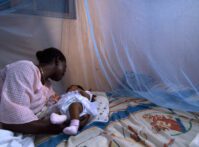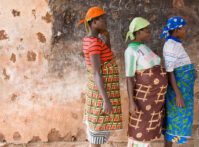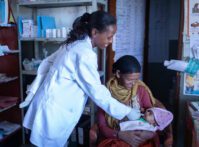-
ECSP Weekly Watch: April 15 – 19
April 19, 2024 By Eleanor Greenbaum
UNFPA’s State of World Population 2024 Report Highlights SRHR Inequalities (UNFPA)
Over the last 30 years, the world has made immense progress in improving sexual and reproductive health and rights (SRHR) for women and girls around the world. Since 1994, when governments agreed that SRHR was a cornerstone of international development at the Cairo International Conference on Population, rates of unintended pregnancies have fallen 20%, 162 countries have adopted anti-domestic violence laws, and maternal deaths have decreased by 34%.
However, inequality in socioeconomic status and ethnicity remain core barriers to improving SRHR in many parts of the world. Women of African descent are the most vulnerable to negative maternal health outcomes, Indigenous women are often denied traditional childbearing practices, and disabled women and girls face up to 10% more gender-based violence, as just a few examples. Numerous and intersectional inequalities plague women and girls globally, increasing their risk of death due to lack of access to timely and meaningful healthcare.
To fulfill the promise of universal SRHR, the United Nation Population Fund’s (UNFPA) State of World Population report argues that we must first root out inequalities that are intrinsic to healthcare systems and policies. Many communities and advocacy organizations have already begun the work, such as young leaders who have recognized that climate justice is also reproductive justice, and that poor communities on the frontlines of climate change “are also those falsely blamed for worsening the crisis because of their high fertility rates.”
READ | Connecting the Dots: Women’s Economic Empowerment and Reproductive Health
Climate Change Expected to Decrease Global Average Income by 2050 (The Guardian)
New research has revealed that rising temperatures and increasing frequency and intensity of extreme weather events is expected to cost $38 trillion in damages by 2050 – a number far higher than the cost to phase out fossil fuels now (about $6 trillion). This will result in global permanent income loss of about 19% by 2049. The United States and Europe will face a reduction of approximately 11%, Africa and South Asia will face far harsher impacts of about 22% income reduction.
The outcomes are projected to be even worse by 2100: without net-zero emissions, projected average income losses will be over 60%. However, with a full transition to renewable energy by 2050, income decline will stabilize to about 20%. The reports’ authors note that these estimates are conservative and require more research–a particularly disconcerting fact considering that these “conservative” estimates are about twice as high as that of previous ones.
The authors propose several solutions to this worrying phenomenon. First, they emphasize that structural change towards a renewable energy system is absolutely necessary to save money and reduce the impacts of climate change. Furthermore, they note the need for stronger adaptation strategies in low- and middle-income nations to cope with the economic losses they will experience because of climate impacts.
READ | A Climate Finance Rethink Can Help Those Most Impacted by Climate Change
Lessons Learned from Solomon Island Carbon Credit Trade (Yale Environment 360)
Carbon credit trade, wherein those looking to offset their CO2 emissions buy “carbon credits” from local communities for their protection of natural resources, is a growing phenomenon. In the Solomon Islands, the Sirebe tribe and its neighboring tribes grouped together to form the Babatana Rainforest Conservation Project. The project grants them legal rights to their lands, from which they sell “high integrity” carbon credits. The Sirebe became the first landowners to receive payment from international investors for protecting their forests.
The group has received five payments since 2022, which are expected to continue until 2045. The project is owned in its entirety by the tribes, who also retain the rights to the carbon on the land. Payments go towards a wide range of local programs, including the Sirebe women’s savings club, whose members use the money to pay for children’s education and fund small businesses, among other uses.
While similar projects have been criticized by the international community as enforcing colonial dynamics by lacking transparency and benefits for local communities, close monitoring shows that this project has provided direct gains for the Sirebe and other members of the Babatana project. At first, the community was skeptical of the project, but after years of continuous engagement, training, and awareness raising, community members largely now think of it in a very positive light.
READ | Money Can Grow on Trees: Forestry Rights Reform for Decarbonization in China
Sources: UNFPA, the Guardian, Nature, Yale Environment 360
 A Publication of the Stimson Center.
A Publication of the Stimson Center.








